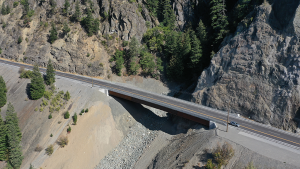LILLOOET, B.C. — Three First Nations and the Province of B.C. are teaming up to make improvements to forest service roads in the Lillooet area of B.C. that will ensure Skatin, Samahquam and Xa’xtsa First Nation members will have safer access to its remote communities.
Approximately 98 kilometres have been identified on the In-SHUCK-ch forest service road for priority improvements, including widening and realigning the road in multiple places, constructing new bridges to replace narrow ones, and improving road surfacing, indicates a release.
The First Nations-led work to refurbish the service roads is being supported through nearly $2.5 million in grants from the which is divided among the nations to support equipment purchases and the training needed to secure roadwork contracts from the .
The grants also ensure opportunities for the Skatin, Samahquam and Xa’xtsa to play a major role in overseeing the quality of access routes surrounding their remote communities, adds the release.
The upgrades aim to benefit all users in the Lillooet, Squamish Region and provide safer access for band members to get to shopping, medical appointments, education resources and would also help in emergency situations such as wildfire or flood evacuation.
Recreational users will also have an easier time travelling to the various trailheads located along the road for remote hiking, wilderness camping, hunting and wildlife viewing. The road will also increase reliable access for industry partners currently accessing the communities and the surrounding area.
“This project work aids the call for assistance in upgrading the In-SHUCK-ch Forest Service Road leading to our community,” said the council for Skatin First Nation in a statement. “Many people have died or been severely injured travelling this road and it continues to impact the quality of life of people who need to traverse it for access to the necessities of life, supplies, education and health care. This work will not only save lives but improve the well-being for all users of this road, including us, the original occupiers of the Lillooet River Valley.”











Recent Comments
comments for this post are closed